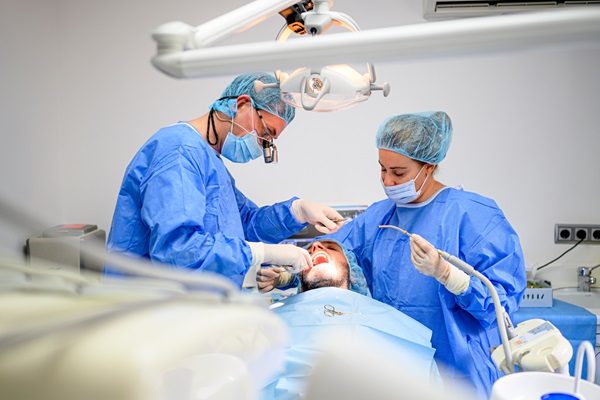Oral Surgeon FAQs

An oral surgeon is also commonly referred to as an oral and maxillofacial surgeon (OMS). An oral surgeon is a dentist who is trained to perform dental procedures on the mouth, jaws, face and teeth. Oral surgeons provide a number of important services and can treat a range of conditions. For complicated procedures such as placing implants and removing wisdom teeth, visiting an oral surgeon is recommended. Read on to learn more about why you should visit an oral surgeon.
Why choose an oral surgeon
Regular visits to a dentist are important for maintaining good oral health. Patients should visit a dentist for regular teeth cleanings and checkups, repairs to damaged teeth, root canals and dentures. However, when an unexpected health issue arises or if a patient needs attention beyond simple repair and maintenance, a person can benefit from visiting an oral surgeon. Here are some frequently asked questions about oral surgeons.
How does a person become an oral surgeon?
An oral surgeon goes through dental school. Oral surgeons then complete at least 4 to 6 additional years of surgical training. They also complete fellowships or seek further degrees for a subspecialty. Oral surgeons are also trained in the administration of anesthesia.
How can an oral surgeon help?
An oral surgeon is trained to perform surgical procedures of the mouth, face and jaw. The surgeons treat accident victims who have facial injuries and also offer reconstructive and dental implant surgery. Sometimes, oral surgeons treat patients with cysts and tumors of the jaw and often place dental implants. The types of surgeries OMSs may perform include tooth extractions, impact teeth removal, soft tissue biopsies and extractions that involve the removal of overlying bone or soft tissue or remaining roots. Others include the removal of tumors in the oral cavity, jaw realignment surgeries and soft tissue repair.
Does a person need an oral surgery referral?
Whether patients need facial reconstructive surgery or wisdom teeth removal, people should follow the right steps to be seen by oral surgeons. In the past, a family doctor or dentist usually referred a patient to an OMS, but nowadays patients can find them online in seconds. A number of OMS practices require a referral. People may also need a referral to fully benefit from their insurance policies. Some medical and dental insurance policies may not accept to cover treatment costs if certain procedures are not followed properly. It is recommended for a patient to contact an oral surgeon and to review the practice’s policies before opting to schedule an appointment.
Visit an oral surgeon
To become an oral surgeon, an OMS needs additional education beyond general dentistry. Oral surgeons perform surgery and other related procedures on the soft and hard tissues of the oral and maxillofacial regions. This allows them to treat injuries, diseases or defects. If you are still not sure of whether to visit an OMS, get in touch with an oral surgeon near you. OMS office staff can help answer any of your questions and guide you in their steps toward diagnosis and treatment.
Request an appointment here: https://stratford.premieroralsurgeryct.com or call Premier Oral Surgery & Implantology Center at (203) 760-0190 for an appointment in our Stratford office.
Check out what others are saying about our dental services on Yelp: Oral Surgeon in Stratford, CT.
Related Posts
If you are nervous about having maxillofacial surgery, you are not alone. Many people would rather avoid it. However, sometimes it is vital for your oral health. In addition, this type of surgery can improve your appearance, oral function, and quality of life. Therefore, getting past any anxiety surrounding maxillofacial surgery is crucial to getting…
Single-tooth implants use dental implant technology to provide long-term and natural-looking solutions to tooth loss. Since losing only one tooth can impact oral health, function, and appearance, replacing the tooth must be a priority. Here is a closer look at the importance of individual tooth replacement and some compelling reasons to consider single-tooth implants.Having a…
Maxillofacial surgery treats issues related to oral health; this includes addressing functional and cosmetic concerns as well. Maxillofacial surgeons go through extensive education and training and choose to specialize in treating more advanced dental concerns that require surgical intervention to properly address.Maxillofacial surgery may be necessary to treat more severe oral health problems. The following…
You might have heard the term “wisdom tooth extraction” often. However, you might not know that every type of extraction does not require surgery. Some kinds only require a simple procedure. Keep reading to find out more about what a wisdom tooth extraction from an oral surgeon involves.In many cases, the wisdom teeth can be…
